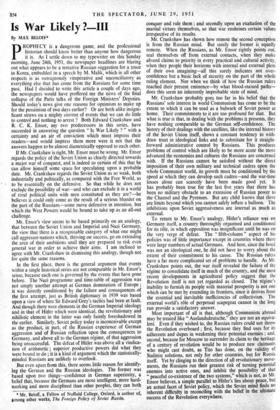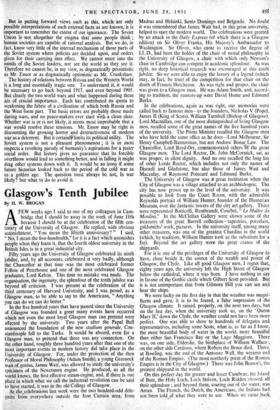Is War Likely ?—III
By MAX BELOFF* • Mr. Beloff, a Fellow of Nuffield College, Oxford, is author of, ornong other works, The Foreign Policy of Soviet Russia. pROPHECY is a dangerous game, and the professional historian should know better than anyone how dangerous it is. As I settle down to my typewriter on this Sunday morning, June 24th, 1951, the newspaper headlines are blaring out what appears to be a tentative Russian suggestion for a truce in Korea, embedded in a speech by M. Malik, which in all other respects is as outrageously vituperative and unconciliatory as everything else that has come from the Russians for some time past. Had I decided to write this article a couple of days ago, the newspapers would have proffered me the news of the final collapse of the Paris talks of the Foreign Ministers' Deputies. Should today's news give one reasons for optimism to make up for the pessimism of two days earlier? Or are both alike insigni- ficant straws on a mighty current of events that we can do little to control and nothing to arrest ? Both Edward Crankshaw and R. - C. K. Ensor, my two predecessors in this series, have succeeded in answering the question "Is War Likely ? " with a certainty and an air of conviction which must impress their readers—and would impress them more were it not that the answers happen to be almost diametrically opposed to each other.
If Mr. Crankshaw is right, Mr. Ensor must be wrong. Mr. Ensor regards the policy of the Soviet Union as -clearly directed towards a major war of conquest, and is indeed so certain of this that he can allow himself some space for speculating upon a probable date. Mr. Crankshaw regards the Soviet Union as so weak, both industrially and politically, as compared with the Free World, as • . to be essentially on the defensive. So that while he does not exclude the possibility of war—and who can exclude it in a world of rival political units with men constituted as they are?—he believes it could only come as the result of a serious blunder on the part of the Russians—some move defensive in intention, but which the West Powers would be bound to take up as an all-out challenge.
Mr. Ensor's view seems to be based primarily on an analogy. that between the Soviet Union and Imperial and Nazi Germany, the view that there is a recognisable category of what one might call aggressor-nations which, thriving on success, go on extending the area of their ambitions until they are prepared to risk even general war in order to achieve their aims. I am inclined to agree with Mr. Crankshaw in dismissing this analogy, though not for quite the same reasons.
In the first place, there is the general argument that events within a single historical series are not comparable in Mr. Ensor's sense, because each one is governed by the events that have gone before. The Nazi programme and time-table of aggression was not simply another attempt at German domination of Europe ; it was directly conditioned by the failure and consequences .of the first attempt, just as British diplomacy in 1939 was based upon a view of where Sir Edward Grey's tactics had been at fault. And though there were elements in the German Imperial ideology and in that of Hitler which were identical, the revolutionary and nihilistic element in the latter was only faintly, foreshadowed in the earlier. Similarly. Soviet policy today is inconceivable except as the product, in part, of the Russian experience of German aggression and of Russian reflection upon the consequences to Germany. and above all to the German regime, of that aggression being unsuccessful. The defeat of Hitler was above all a vindica- tion of arithmetic ; superior productive powers did what they were bound to do ; it is a kind of argument which the statistically- winded Russians are unlikely to overlook.
But even apart from this, there seems little reason for identify- ing the German and the Russian ideologies. The former was based upon two things—confidence in German superiority, a belief that, because the Germans are more intelligent, more hard- working and more disciplined than other peoples, they can both conquer and rule them ; and secondly upon an exaltation of the martial virtues themselves, so that war enshrines certain values irrespective of its results.
Mr. Crankshaw has shown how remote the second conception is from the Russian mind. But surely the former is equally remote. When the Russians, as Mr. Ensor rightly points out, seal themselves off from external contacts, when they make absurd claims to priority in every practical and cultural activity, when they people their horizons with internal and external plots of their own imagining—all this surely indicates not over- confidence but a basic lack of Security on the part of the whole ruling element. Nor when we think of how the Russian rulers reached their present eminence—by what blood-stained paths— does this seem an inherently improbable state of mind.
Mr. Crankshaw probably goes too far in his belief that the Russians' sole interest in world Communism has come to be the extent to which it can be used as a bulwark of Soviet power at home. Their commitments to it are too profound for that. But what is true is that, in dealing with the problems it presents, they have nothing comparable to the German self-confidence. The history of their dealings with the satellites, like the internal history of the Soviet Union itself, shows a constant tendency tO with- draw trust in ideological links and to substitute for it straight- forward administrative control by Russians. This produces problems of control which are likely to be more acute the more advanced the economies and cultures the Russians are concerned with. If the Russians cannot be satisfied without the direct imposition of their own military and technical cadres upon the whole Communist world, its growth must be conditioned by the speed at which they can develop such cadres—and the war-time losses alone can scarcely have been made good yet. It has 'probably been true for the last five years that there. has been no military obstacle to an extension of Russian power to the Channel and the Pyrenees. But any child knows that there are limits beyond which you cannot safely inflate a balloon. The inhibitions upon Soviet aggressiveness are internal as much as external.
To return to Mr. Ensor's analogy, Hitler's reliance was on Germany itself, a country thoroughly organised and conditioned for its role, in which opposition was insignificant until he was on the very verge of defeat. The " fifth-column " aspect of his policies was of little importance except in countries where there were large numbers of actual Germans. And here, since the bond was not an ideological one, he did not have to worry about the extent of their commitment to his cause. The Russian rulers have a far more complicated set of problems to handle. As Mr. Crankshaw points out, the war itself revealed the failure of the regime to consolidate itself in much of the country, and the most recent developments in agricultural policy suggest that the Revolution itself is not yet regarded as closed. The regime's inability to furnish its people with material prosperity is not one which can be met by extending its frontiers, since it derives from the essential and inevitable inefficiencies of collectivism. The external world's rale of perpetual scapegoat cannot in the long run provide a satisfactory answer.
Most important of all is that, although 'Communists abroad may be treated like " Auslandsdeutsche: they are not an equiva- lent. Even if they wished to, the Russian rulers could not throw the Revolution overboard; first, because they find uses for its adherents and dupes in weakening their potential enemies ; and, second, because for Moscow to surrender its claim to the heritage of a century of revolution would be to produce new claimants who might cast doubt, as Tito has done, on the validity of Stalinist solutions, not only for other countries, but for Russia itself. Yet by clinging to the direction of all revolutionary move- ments, the Russians run their greatest risk of turning potential enemies into active ones, and inhibit the possibility of that "peaceful co-existence of the two systems," which is not, as Mr. Ensor believes, a simple parallel to Hitler's lies about peace, but an actual facet of Soviet policy, which the Soviet mind finds no inherent difficulty in reconciling with the belief in the ultimate success of the Revolution everywhere. But in putting forward views such as this, which are only possible Interpretations of such external facts as are known, it is important to remember the ektent of our ignorance. The Soviet Union is not altogether the enigma that some people think ; human societies are capable of rational analysis. But we do, in fact, know very little of the internal mechanism of those parts of the Soviet system where policies are decided upon, and orders given for their carrying into effect. We cannot enter into the minds of the Soviet leaders, nor see the world as they see it. Therefore we cannot be. in my view, as dogmatically pessimistic as Mr. Ensor or as dogmatically optimistic as Mr. Crankshaw.
The history of relations between Russia and the Western World is a long and essentially tragic one. To understand it, it would be necessary to go back beyond 1917, and even beyond 1905. But clearly the two world wars and what happened during them are of crucial importance. Each has contributed its quota to weakening the fabric of a civilisation of which both Russia and the West form part. The basic errors are probably those made during wars, and no peace-makers ever start With a clean slate. Whether war is or is not likely, it seems most improbable that a war would resolve these tensions. Mr. Ensor may be right in discounting the growing horror and destructiveness of modern war as a deterrent. But it certainIflimits its political utility. The Soviet system is not a pleasant phenomenon ; it is in most respects a revolting parody of humanity's aspirations for a juster social order. But history gives no guarantee that its forcible overthrow would lead to something better, and in falling it might drag other systems down with it. It would be an irony if some future historian looked back to the period of the cold war as to a golden age. The question must always be not, Is war likely? but what to do to avoid it.



































 Previous page
Previous page